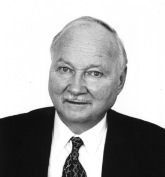 Maurice Strong Executive Coordinator for U.N. Reform
"The proposed reforms are intended to create a more unified development system within the UN... A unified structure means more funds can move from administration into true development." |
Final word on U.N. reforms will be with Governments, says Strong UNITED NATIONS, May 28 (G-77)-- Maurice Strong, who has been appointed to coordinate the reform of the UN system, said that Secretary-General Kofi Annan wants a United Nations that ''will be strong in development.'' ''The Secretary-General wants to strengthen the U.N.-- a U.N. that will be stronger in development and a U.N. that will be able to fulfil the mandates that has been given to it by the General Assembly,'' he said. In an interview with the JOURNAL OF THE GROUP OF 77, Strong said if some of those mandates are obsolete or need to be revisited, the Secretary-General can make suggestions. ''But in the final analysis, the decisions can be taken only by governments. And the Group of 77 represents the majority of the governments in this house,'' he added. JOURNAL: The Group of 77 has expressed fears that as part of the reform of the U.N. system, it is possible that some of the programmes mandated by the General Assembly may fall by the wayside? Are there any validity to these fears? STRONG: It is understandable that the Group of 77 would have those concerns. But let me say that, first of all, the Secretary-General does not have any powers to disband the programmes mandated by the General Assembly. What he can do is to examine them, and if he believes it needs to be changed, he can recommend it to the General Assembly and they can have the final say. JOURNAL: What are the powers and limitations of the Secretary-General in the reform process? STRONG: The Secretary-General has certain powers as chief administrative officer of the United Nations. He can move staff around, he can do a number of things. And he is going to do them and he has already done some of them. But the more fundamental changes that either involve eliminating organisations or making basic changes in their original mandates, he cannot do that. He can only recommend them. And he will make recommendations only in consultation with governments. JOURNAL: Is the U.N. proposing to bring some of the Funds and Programmes-- such as the U.N. Development Programme (UNDP), the U.N. Children's Fund (UNICEF), the U.N. Population Fund (UNFPA) and the World Food Programme (WFP)-- under a single authority? STRONG: Yes, this is one of the things that is being considered. It is not really to bring these Funds and Programmes under a single authority. In one sense, they are now all under the general authority of the Economic and Social Council (ECOSOC) and the General Assembly. They are also under the Secretary-General for administrative purposes. The proposed reforms are intended to create a more unified development system within the UN. What has happened over the years is that-- and this is not meant to be a criticism, it is just the way it happened-- we evolved a system that was very fragmented. We have a whole series of different organisations-- and they are all very valuable and useful-- but it is a costly system. A great deal of money is spent in servicing these different organisations. So we wanted to do this-- not to create a homogenous organisation-- but to make sure that the essential qualities of each of these organisation are maintained. They are all very fine organisations. They have personalities, they have qualities and they have character. They have their own distinctive roles to play -- UNICEF, UNDP and UNFPA-- these are all very important. We are not trying to get rid of them. We are only trying to ensure that they operate within a family structure. Each one will be doing its job but within a more unified structure-- both in the field and at headquarters. JOURNAL: What would a unified structure entail? STRONG: A unified structure means more funds can move from administration into true development. It also means that developing countries will find it much simpler to deal with the UN family. The donors will hopefully trust the UN with more money when they see that it is more effective. So it is really a movement, not towards homogenizing the system but, ensuring that we act towards a common framework. |